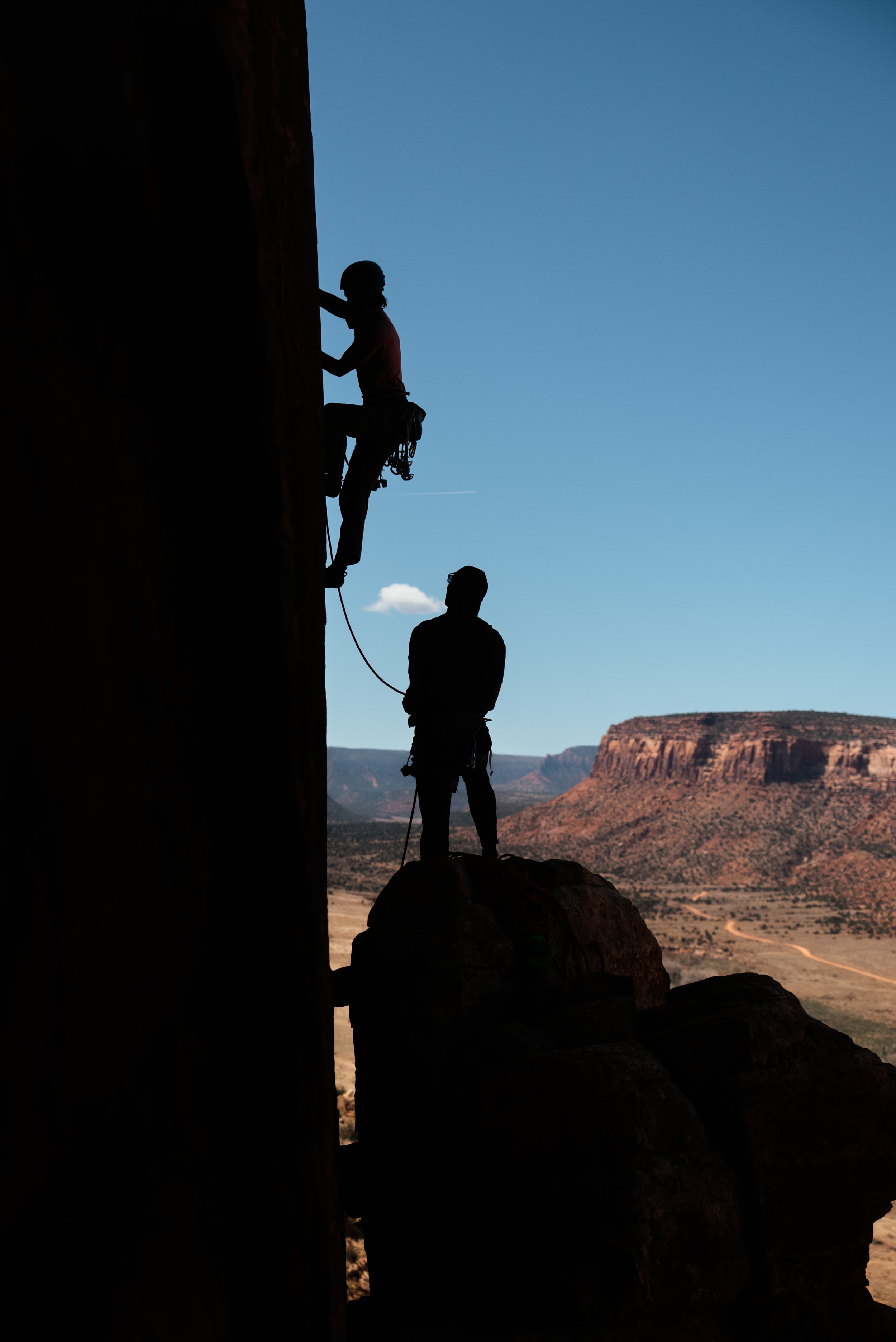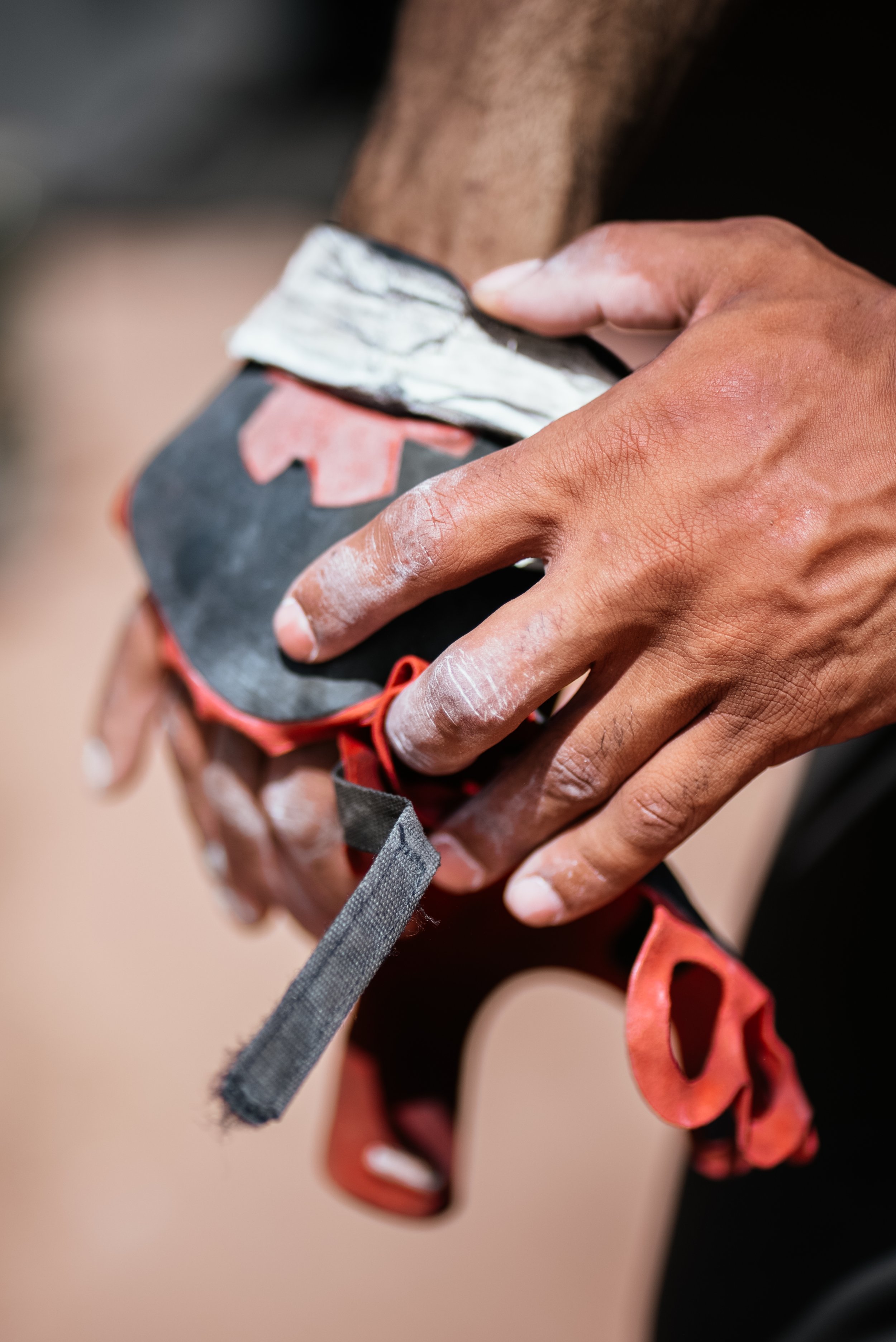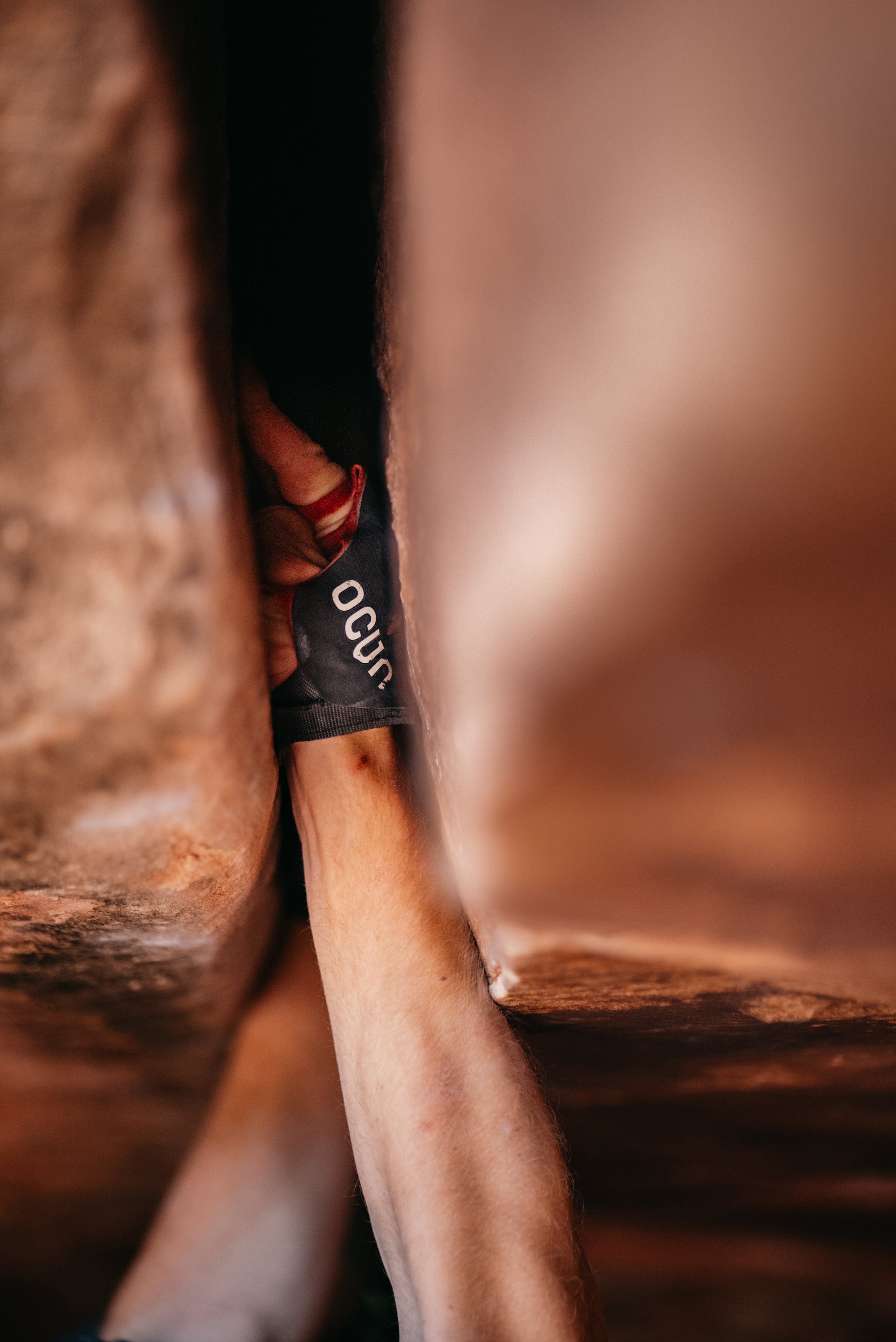A Rock Climbing Film Expedition to Indian Creek
We awoke on our first day to rain...
Rain in the desert is always a bit of an unsettling feeling. Witnessing this typically dry, orange landscape become a muddy, gray mess felt almost sacrificial. The rain also meant we couldn’t climb. Sandstone, the type of rock that makes up these beautiful red/orange cliff faces in Utah, is fragile and can easily break, flake, and ache under the pressure of a climbing shoe when it’s wet. So, our climbing trip began with two days of sitting in coffee shops editing, writing, and praying for the sunny and windy weather to break through and dry off the rock.
Then, after we waited the standard 48 hours, the climbing trip truly began…
Aidan leading the first climb of the trip after the rain, a 5.10b called Texas Two Step on Maverick Buttress
Located about an hour south of Moab, Utah lies Indian Creek.
Indian Creek is home to some of the United States' most iconic crack climbs. What Hawaii is to surfers, Indian Creek is to crack climbers. As far as the eye can see, there are beautiful splitting vertical cracks in the sandstone that make most crack climbers’ mouths water with excitement.
From left to right - Noah, Vivian, Aidan and Chris begin the long approach to Rambo Wall.
Not only were we in the best place for climbing, but we also assembled quite a crew.
Leading the charge was rock climbing YouTuber and filmmaker Noah Kane. Noah is a childhood friend, college filmmaking buddy, and now professional collaborator on some of the biggest projects of both of our careers. Next, we had Chris Stanford. Chris brought the party. With an endless supply of afro beats playlists and his pink flamingo shorts, Chris began or ended a climbing session without a smile. Chris and I met through social media but have since become filmmaking and climbing buddies. Chris was the belayer of one of my previous documentaries, Unseen Peaks, about a blind climber attempting to find freedom and acceptance in the outdoors.
Third, Aidan Kingsley. Aidan and Noah have been climbing partners for a while but it’s been a couple of years since my last climbing adventure with Aidan where we attempted to summit Castleton Tower. Although the summit mission was shut down, I walked away with some of my favorite climbing photos of my career. Finally, Vivian Finck. Vivian and I first met a few years ago on a deep water solo adventure in Puerto Rico with Noah and a few other friends. This was her first attempt at crack climbing and, despite her audible disdain for the pain involved in jamming her hands and feet into these tiny cracks, she crushed just as much as the rest of the crew who have been crack climbing for years.
Our collective climbing objective was simple:
have fun and do things we’ve never done before.
Noah setting off on “The Expendables” on Rambo Wall with Chris on belay
Despite our collective goal, we each had our own small projects or goals we wanted to accomplish. For me, I wanted to walk away with beautiful photos and videos while honing the technical skills of filming rock climbing from above. That goal was easily accomplished within 10 minutes of our first session but, throughout the trip, I was consistently trying to rework and improve my skill set as an “expedition rock climbing filmmaker”. I’m not much of a crack climber, so being suspended on the wall with my camera was a perfect way to enjoy the day while all my friends struggled and pushed past their limits.
Noah’s main goal was Annunaki.
Annunaki is this wild, lightning-shaped overhanging crack climb that’s been a constant test piece for Noah on his previous trips to Indian Creek. On his first trip, he made it about halfway up the route but wasn’t strong enough to complete it. On his last visit, a year ago, he was just shy of finishing when the finger strength gave out on the last move. After 50 ft of climbing, it all came down to inches.
This time, he was feeling hopeful…
Noah’s been training for this, even going so far as building a home crack climbing gym in his family’s barn in Vermont. His determination showed as he tied in. His hands coated with just the right amount of chalk to prevent the sweat of his hands from being the reason he can’t complete it this year. Then, he set off the ground. The first hand jam looks solid. His toes enter the crack while his knee, initially turned away from his body to allow his toes to fit, cranks inwards and locks in his toes.
Aidan’s big send attempt on Annunaki began like Noah’s, flying through the first section until the ring locks.
Noah and Aidan cracking jokes before Noah’s attempt at Annunaki
A left hand reaches tall and finds another small section of the crack to lock him in. The right foot follows suit, toes in, knee rotates, and quads propel Noah further up the overhanging lightning bolt. His arms resemble a swimmer’s movement more than a rock climber's. His extended shoulders, flat hands, and fluid movements clearly demonstrate the feeling most climbers chase. For the first half of the climb, it didn’t feel like filming climbing, but documenting an artist putting his creative spin on a canvas.
About halfway up, he finds his rest before the crux section at the top. Then, the art gave way to struggle. There are two moves that made Noah especially nervous:
The knee bar and the ring locks.
The knee bar occurs about 10 feet from the top and serves as a rest before the crack thins and the difficulty ramps up all the way to the finish. When he approaches, he sticks his leg in the crack and lays back, with his entire body weight resting on his right upper knee. His hands can rest. However, this rest is not without its discomfort, so while he shakes out his hands to get rid of the lactic acid and pain that’s building in his hands, his brain is telling him to keep going. So, a short 60 seconds later, he keeps climbing. Now, the crack is so thin that only his fingers can fit.
This highly technical section is what killed his chances in the past.
Noah first places his thumb in this dicey, thin overhanging section just a few feet from the anchors which marks the finish line. Once his thumb is jammed in, he carefully wraps his index and middle finger over his thumb for added support. The crack that makes up Annunaki starts the width of a fist and later becomes so thin that the width of Noah’s thumb is all he is able to use to drive him up the wall. He pulls on his first ring lock, and his body ascends. Then, he places another ring lock in his left hand, and his feet follow. On his final ring lock before he reaches the anchors to clip his rope, he lets out a subdued scream. The weight of his body on his thumb in the crack made his thumb slide against the rock and begin to bleed.
However, this has been a three-year journey for Noah and he wasn’t going to let a little blood get in the way of his goal. So, he pushed off his right foot, unweighting his hand, and slid his thumb out of the crack. From that move, he clipped his rope into the anchors above the crack.
He was done.
Succesful Failures
After Noah successfully completed Annunaki, the rest of the group attempted it with varying degrees of success. Some completed it with some added rests on the rope while others couldn’t manage to utilize the ring lock technique needed to complete the final few feet. However, these weren’t failures. Our goals were to have fun and do things we’d never done before. All of us achieved those goals. It’s easy to get caught up in pushing farther and chasing more routes, but this trip wasn’t about proving ourselves as elite climbers.
This trip was about trying new things. I experimented with new ways to rig and ascend ropes to capture some of the photos you see here. Vivian spent some time in the shade honing her skills as a writer as we all climbed. Aidan, after multiple climbing trips to Indian Creek, attempted new routes. Noah, as you might be able to guess, was quite happy with his new experience on Annunaki.
Noah posing for a photo at sunset on “Blue Sun” for my behind-the-scenes video of how to film rock climbing (coming May 2024)
This was my first trip to Indian Creek and it was not void of adventure.
What started as a bleak, rainy (non) climbing trip to the desert soon became much more. We bathed in puddles and ate leftover pad Thai under the stars. We pooped in bags to follow the leave no trace guidelines since poop doesn’t properly decompose in the desert soil. We drove the gnarliest roads and had deep conversations about life, love, and climbing.
When it was all over and we were hopping in the cars to head up, Chris said something that sums up the journey quite well.
“At the end of the day, it’s nice to climb with great climbers but, more importantly, I really just want to climb with great people.”
Although I normally do have an office indoors, the front of the car served as an adequate substitute for the week.
Let’s Connect
Roo is a commercial/documentary filmmaker and photographer based in Boulder, Colorado but travels all around the world for his filmmaking career. He has directed documentaries for Patagonia in California, produced films for Outside Magazine throughout Europe and Africa, camera operated for Netflix in the Rocky Mountain West, photographed among indigenous communities in South America, and has received notable recognition in his hometown of Orcas Island in Washington State for his work telling uplifting stories in the outdoor space.













